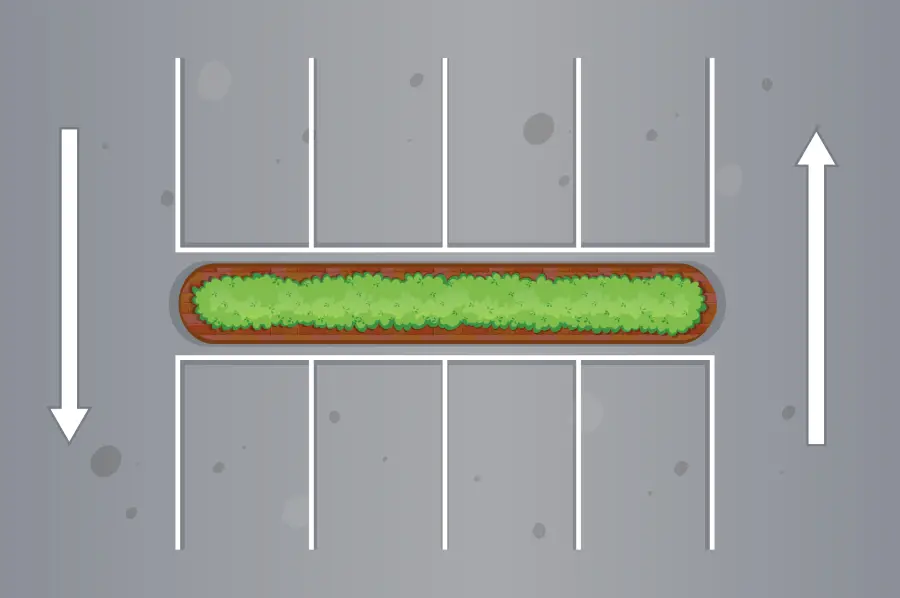When you’re building a new driveway or upgrading an existing one, one of the most important decisions to make is the driveway width. Whether you own a compact car or multiple SUVs, selecting the right width ensures not only a more functional driveway, but also improved curb appeal, vehicle safety, and fewer maintenance issues down the line.
So, what is the average driveway width? A complete guide for homeowners like you can help you make an informed decision about layout, material, and usage. The correct driveway dimensions will ensure that your vehicles fit comfortably, passengers can open doors without stepping into your landscape, and your driveway lasts for many years. You’ll also want to understand related considerations, such as when is it too late to seal a driveway or how a chip seal driveway compares to traditional options.
Let’s break down everything you need to know about choosing the ideal driveway width.

How Wide Are Most Residential Driveways?
The standard driveway width for residential properties varies depending on the type of driveway, the number of cars you plan to park, and local zoning requirements. However, most residential driveways fall within the range of 10 to 24 feet wide.
A single-car driveway typically ranges from 10 to 12 feet wide. This provides enough space for a standard vehicle and a bit of room to open car doors and maneuver.
For two-car driveways, the recommended width is between 20 to 24 feet. This allows two vehicles to park side by side without being cramped.
Three-car driveways often range from 30 to 36 feet wide. This size gives you the flexibility to park three vehicles or use one bay as a turnaround or workspace.
What Width Do You Need for a Driveway?
The width of your driveway depends on your household needs, vehicle types, and available space. Ask yourself the following questions when planning your driveway:
- What kind of vehicles do you own? Larger vehicles like trucks and SUVs require more space than compact cars.
- Will you be parking multiple cars? Two cars parked side by side need at least 20 feet of space.
- Do you have room to open car doors fully? A few extra feet can help avoid dinging doors or stepping into flower beds or grass.
- Are you including room for guests or turnarounds?
- What are your local zoning or neighborhood restrictions?
Minimum driveway width for basic use is 10 feet, but most homeowners find 12 feet or more to be more comfortable for everyday use.
Is 8 Feet Wide Enough for a Driveway?
While it is technically possible to build an 8-foot-wide driveway, it’s not advisable for regular residential use. This narrow width leaves little room for error and can make driving in and out challenging—especially if your vehicle is wide or if you need to open your car doors.
Most driveway contractors recommend at least 10 feet wide for a single-car driveway. If your space is limited and you’re considering a narrower installation, be prepared for limited functionality and higher risk of damage to the driveway edges.
How Wide Is a Standard 2 Car Driveway?
A standard 2 car driveway is generally 20 to 24 feet wide. This allows for two average-sized vehicles to park side by side with enough room to open doors and walk around each vehicle comfortably.
When planning for a two-car driveway, keep in mind that wider is often better. Even an extra 2 feet can prevent tires from going off the edge, especially in poor weather conditions or when guests are parking.
Ideal Driveway Width Based on Usage
Not every homeowner uses their driveway in the same way. Here are typical driveway width guidelines based on how you plan to use the space:
- One car: 10 to 12 feet wide by 20 to 24 feet long
- Two cars: 20 to 24 feet wide by 20 to 24 feet long
- Three cars: 30 to 36 feet wide
- Circular driveway: 12 feet minimum width for smooth navigation
- Turnaround areas: 10 to 20 feet wide depending on layout
If you’re planning on using your driveway for parking, driving, or as a pathway to a garage, your design should accommodate turning and door opening. A wider driveway may require a larger budget, but it can significantly reduce the risk of long-term damage.
Planning Your Driveway Width with Functionality in Mind
When planning your new driveway, consider the following:
- Think about the future. Will your household add another car? Are you planning to purchase a larger vehicle?
- Include enough space for children, guests, and deliveries.
- Consider adding an apron or turnaround to make it easier to enter and exit your property.
- If you live on a slope, you might need additional width for safe navigation.
Material also matters. A gravel driveway may need extra width to accommodate stone migration, while a chip seal driveway offers more stability at the edges. A concrete driveway provides cleaner lines but may crack at the edges if too narrow.
Driveway Materials and How They Impact Width Planning
Different driveway materials perform differently over time. Here’s how each might affect your driveway width decision:
- Asphalt driveway: Best when installed with a solid edge or curb. Narrow asphalt can crumble at the edges under vehicle pressure.
- Concrete driveway: Holds up well to edge stress, but costs more per square foot, so homeowners may opt for narrower designs to save money.
- Gravel driveway: Requires more width than paved surfaces due to loose stones shifting over time.
- Chip seal driveway: A cost-effective and stable solution that offers a rustic aesthetic and excellent edge durability.
Material choice should be aligned with the number of vehicles and how often you use your driveway.
Should You Add Extra Width?
A wider driveway may seem unnecessary at first, but it pays off in convenience and longevity. Adding just 1 to 2 extra feet can make a significant difference when opening car doors or pulling in groceries. It also helps guide vehicles safely, especially for younger or less experienced drivers.
Don’t forget to review the width of driveway openings at the street or curb. Local codes may set minimum and maximum width limits for these connections, and a driveway contractor can help ensure your project complies.
What Is the Average Driveway Width? A Complete Guide for Homeowners
Understanding what is the average driveway width? A complete guide for homeowners shows that proper planning makes all the difference. From small one-car driveways to large three-car layouts, choosing the right width is about more than just space—it’s about usability, comfort, and long-term value.
If you’re unsure about the ideal width for your project, don’t guess. JR Paving & Construction Co Inc has decades of experience designing and installing driveways that are both beautiful and functional. Whether you need a new concrete driveway, a gravel path, or are exploring cost-effective alternatives like chip seal driveway solutions, our team is ready to help.
Call JR Paving & Construction Co Inc at 800-888-9833 to get a free estimate and ensure your driveway meets your needs for years to come. From layout to paving, we’ll guide you every step of the way.


